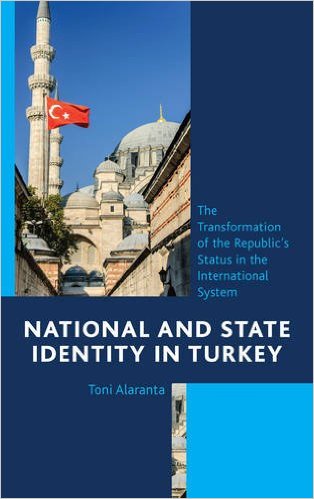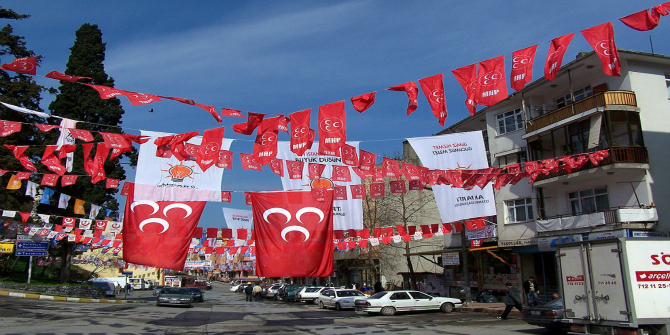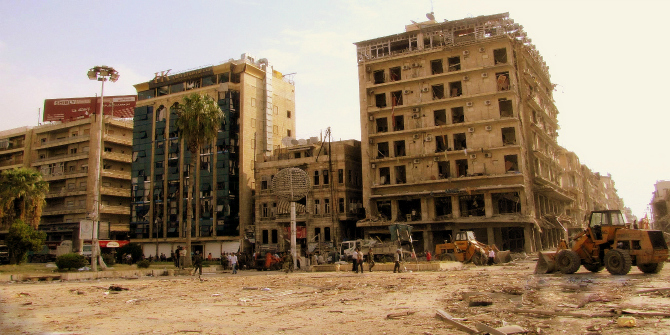In National and State Identity in Turkey: The Transformation of the Republic’s Status in the International System, Toni Alaranta examines the impact that the Justice and Development Party (AKP) has had on various strands of Turkish national identity since coming to power in 2002. Although Megan Smith highlights some structural oversimplifications in the book, she nonetheless positions Alaranta’s study as a rich and valuable account of contemporary Turkish identity politics.
National and State Identity in Turkey: The Transformation of the Republic’s Status in the International System. Toni Alaranta. Rowman and Littlefield. 2015.
 Toni Alaranta, a senior research fellow at the Finnish Institute of International Affairs, explores the changes in Turkey’s national identity since the Justice and Development Party (AKP) came to power in 2002. Using a Wendtian constructivist approach, he examines Turkey’s role in the international system and its foreign policy through the paradigms of national and state identity. This way of framing the research agenda within the discipline of International Relations calls for an analysis operating on both the domestic (unit) and international (systemic) levels, because these are the two layers that together give some indication as to why and how certain state interests became legitimate in the almost centennial subsistence of the Turkish Republic (29). Alaranta essentially posits that the link between the changes in Turkey’s national identity brought about by the AKP regime and the structural changes in the international system has remained inadequately addressed. The constructivist approach, which focuses strongly on domestic politics in explaining Turkey’s foreign policy behaviour, enables the author to take a critical stance towards the dominant feature in the scholarship on Turkey – the idea of an ‘omnipotent Kemalist state’ repressing a ‘weak’ society.
Toni Alaranta, a senior research fellow at the Finnish Institute of International Affairs, explores the changes in Turkey’s national identity since the Justice and Development Party (AKP) came to power in 2002. Using a Wendtian constructivist approach, he examines Turkey’s role in the international system and its foreign policy through the paradigms of national and state identity. This way of framing the research agenda within the discipline of International Relations calls for an analysis operating on both the domestic (unit) and international (systemic) levels, because these are the two layers that together give some indication as to why and how certain state interests became legitimate in the almost centennial subsistence of the Turkish Republic (29). Alaranta essentially posits that the link between the changes in Turkey’s national identity brought about by the AKP regime and the structural changes in the international system has remained inadequately addressed. The constructivist approach, which focuses strongly on domestic politics in explaining Turkey’s foreign policy behaviour, enables the author to take a critical stance towards the dominant feature in the scholarship on Turkey – the idea of an ‘omnipotent Kemalist state’ repressing a ‘weak’ society.
Examining the two extreme positions of Turkey’s national identity, ranging from Kemalist secularism to political Islam, Alaranta describes tensions between the two through the discursive prism of a ‘New Turkey’. This is a narrative of Othering that refers to the widely held, epochalist opinion that the AKP’s coming to power in 2002 started a whole new era in Turkish political history – one of democratic consolidation and affluence. The discourse has hereby prevailingly been instrumentalised by the hegemonic AKP elite against Turkey’s ‘domestic other’, or minorities who do not align with the Turkish/Muslim ‘Self’. The Self/Other discourse underpinning the concept of a ‘New Turkey’ has been the driving force in Turkey’s inter-state relations, especially regarding accession to the European Union.
Alaranta further argues that the making of a ‘New Turkey’ has been a Janus-faced project. Contrary to the Republic’s Kemalist political legacy, which inter alia apprehended secularism as containing Islam and its political ambitions, ‘New Turkey’ principally entailed the cultural and political genesis of an Islamic conservative counter-elite (93). It is indeed impossible to interpret the meaning of the ‘New Turkey’, Alaranta ascertains, unless it is seen in close relationship to the Islamic conservative ideology espoused by the AKP leadership. Against this backdrop, AKP’s process of ‘Othering’ – be it of Kemalists, Kurds, Alewites and so forth – has followed a logic of equivalence foregrounding the historical repression of pious Sunni Muslims (95).
 Image Credit: Flags of political parties before the Turkish municipal elections in Şile (Darwinek)
Image Credit: Flags of political parties before the Turkish municipal elections in Şile (Darwinek)
Alaranta’s justification for National and State Identity in Turkey: The Transformation of the Republic’s Status in the International System has thus been to analyse the relationship between a transformed national identity and Turkey’s role in the international system through the lens of ‘identity’. The argument here is that a transformed national identity only makes a real difference if that altered national identity coincides with changes in the international system (21). The author’s argument hence gains momentum given the recent changes in the region’s political geography, such as the suspension of the Kurdish-Turkish peace process and the imminent menace of ISIL at the borders of Turkey. In this regard, Alaranta aptly conceives identity formation as a reciprocal process occurring within the state/system dichotomy. However, the author fails to elucidate on the pivotal role of civil society as well as international Sunni orders – the Gülen movement first and foremost – in consolidating Turkey’s transformed ‘national identity’. Yet, giving an elaborate historical account overall, Alaranta’s line of reasoning still does not shed light on the possible impact of actors outside of the state/system duality.
Nonetheless, his critical reassessment of AKP’s democratic reforms seems pertinent, with Turkish domestic politics being to a significant degree coined by competing narratives of Islamic and Western identities. The overly optimistic narrative by policymakers that Turkey has created a workable synthesis between western liberalism and its Islamic identity is, however, hardly convincing. Drawing on Samuel Huntington’s ‘Clash of Civilizations’ hypothesis, Alaranta argues that the hegemonic, religious discourse and subsequent intolerance towards opposing opinions have, in fact, made the Republic a ‘conservative democracy’. Or, in other words, an Islamic-conservative majority is sanctified, whereas the project of a pluralist, liberal democracy is sacrificed, in the name of national unity. The latter particularly made itself felt in the course of the 2013 Gezi protests during which Recep Tayyip Erdoğan painted highly diverse groups of protestors with the same brush – as capulcu (marauders) or vatan hainleri (people who have betrayed their homeland).
However, Huntington’s conceptual framework, Alaranta pointedly asserts, is misleading with regards to Turkey, since civilisational entities do not constitute actors in world politics, but rather serve as politicised, ideological blocs to mobilise constituents behind a domestic and foreign policy agenda – as has been the case with the ‘New Turkey’ (127). Defined by a nationalist, religious label, the project furthermore saw Erdoğan having almost been put on a par with the Republic’s sacrosanct father-figure Mustafa Kemal.
Most notably, Alaranta finally exemplifies how the Erdoğan administration instrumentalised the EU accession process and concomitant reforms in order to consolidate its power within the institutional structures of the Turkish state (125). AKP’s proactive foreign policy has hereby not only halted the accession negotiations, but also increasingly isolated Turkey in the Middle East, as the AKP claims that all current unrests in the region are merely a symptom of an illegitimate, Western system in the Middle East. Yet, illustrating that the Islamisation of Turkey has been rooted in the interplay of domestic factors and the international system, Alaranta’s study is a historically rich and illuminating account of the rise of political Islam. Despite a number of aforementioned structural oversimplifications, National and State Identity in Turkey offers a valuable and insightful introduction to Turkish identity politics overall, and contextualises the inherent problems of an ethnically and religiously diverse society ambitiously trying to find its place in an anarchic, international order.
Megan Denise Smith has recently completed her MSc in International Relations at the LSE. She has worked throughout East Africa and the Middle East with most recent fieldwork conducted in Egypt with the Africa and Middle East Refugee Assistance. Her research focuses on refugee assistance with a special focus on gender. Follow her on Twitter at @Megan_D_Smith. Read more reviews by Megan Smith.
Note: This review gives the views of the author, and not the position of the LSE Review of Books blog, or of the London School of Economics.







1 Comments